Dry Nose in Dogs is caused by a variety of factors, ranging from external to internal causes. External factors include weather conditions, dehydration and allergens. Internal factors include age, stress, medical issues such as autoimmune disorders, dermatitis and skin infections. These causes can result in cracking and drying of the nose.
Moreover, some breeds like the chow chow, bulldogs and pugs are prone to having dry noses due to their facial structures or genetic predisposition. Providing adequate hydration through water intake and avoiding exposure to irritants may prevent dry nose in dogs. Maintaining general health through regular check-ups will also help identify underlying medical issues early.
It is important to note that not all dry noses indicate an issue with the dog’s health. A moist nose does not necessarily equate to good health either. Assessing the dog’s overall behavior and daily activities can provide better insight into any underlying problems regarding their general well-being.
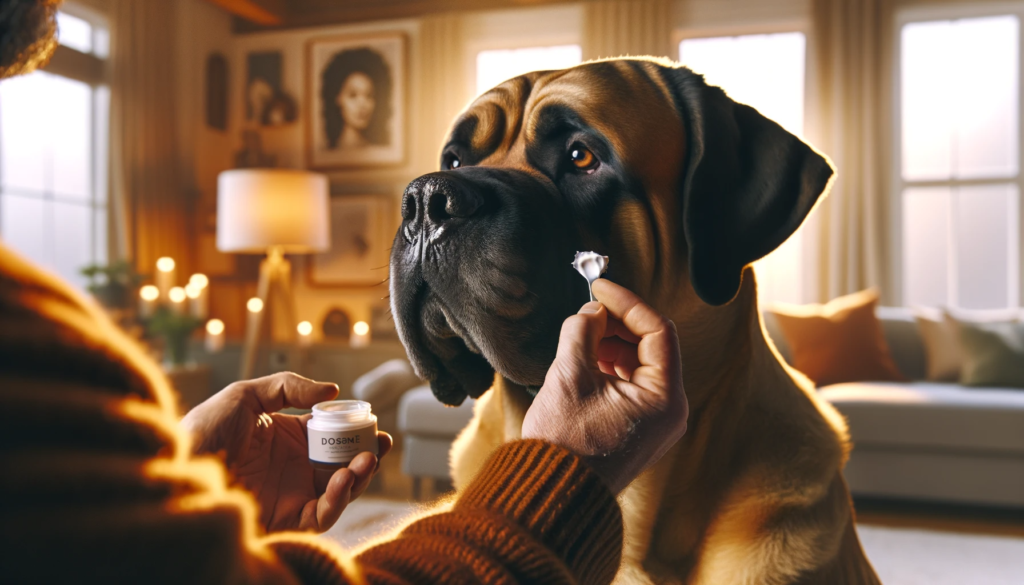
Health Concerns Related to Dry Nose
A dry nose in dogs can indicate a potential health problem. Concerns regarding this condition may range from minor discomfort to serious medical issues. Symptoms include cracks, bleeding, and abnormal discharge. Additionally, prolonged dryness may lead to loss of smell and appetite.
It’s essential to keep your pet’s nose moistened with balms and veterinarian-prescribed treatments as necessary. Proper care reduces the risk of infections that can cause complications such as pneumonia or sinusitis.
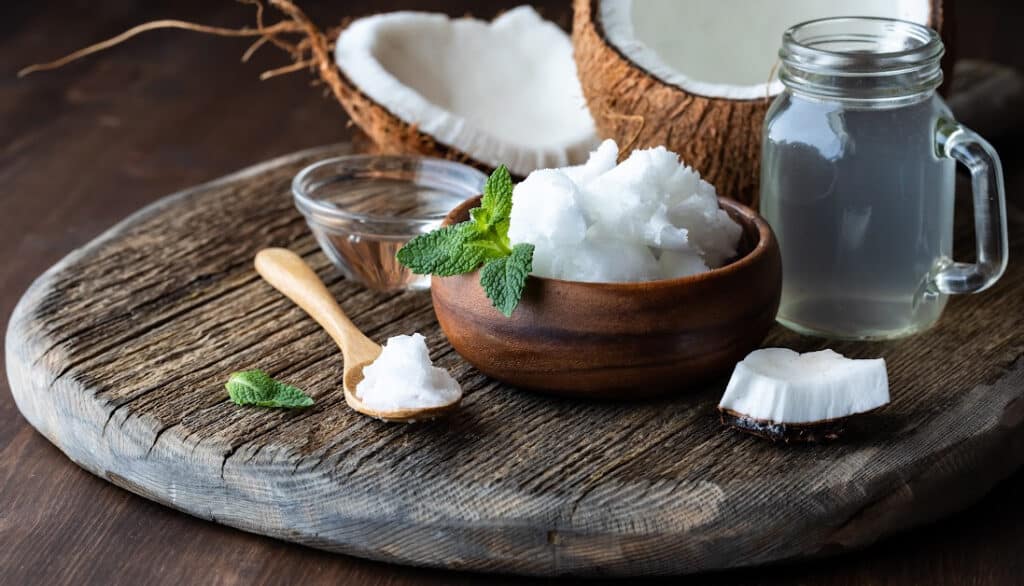
Home Remedies for Dry Nose in Dogs
To alleviate your dog’s dry nose, try these home remedies. Coconut oil, shea butter, olive oil, vitamin E oil, and petroleum jelly can all offer relief. Each of these remedies provides unique benefits and can help restore moisture to your furry friend’s nose.
Coconut Oil
Using the versatile and natural substance extracted from coconuts, coconut oil is increasingly becoming a popular choice as a home remedy for addressing dry nose in dogs. Here are four reasons why:
- Hydrating properties: Coconut oil contains fatty acids that can keep your dog’s nose moisturized and prevent excessive drying.
- Antibacterial effects: Applying coconut oil to your dog’s nose can also help guard against any potential bacteria that may be present.
- Safe ingestion: In case your dog ingests some of the coconut oil, rest assured it is non-toxic and safe for consumption.
- Cost-effective solution: Coconut oil is relatively cheap and readily available in most grocery stores or online shops, making it a cost-effective remedy compared to other commercial options.
It is important to note that while coconut oil has been proven to be effective in treating dry noses in dogs, it should only be used externally. Additionally, make sure to apply only a small amount as over-greasing can lead to skin irritation.
Going the natural route with ingredients like coconut oil could be the best option when dealing with dryness on your canine’s nose. With its plethora of benefits, coconut oil remains one of the go-to at-home remedies recommended by vets worldwide.

Shea Butter
- Shea Butter contains high levels of fatty acids and vitamins that moisturize and soothe dry skin.
- It can protect your dog’s nose from further damage such as cracking and bleeding.
- Application of Shea Butter creates a barrier against harsh environmental conditions like wind, cold or heat.
- The anti-inflammatory properties present in Shea Butter relieve itchiness and redness on the nose.
- Shea butter is safe for your furry friend, and its application doesn’t pose any risk if ingested during licking.
- If you use raw shea butter, store in an air-tight container and keep away from light and heat to preserve its nutrients.
So, while nurturing your dog’s dry nose with the goodness of shea butter ensures their safety while also providing them with essential nourishment.

Olive Oil
Using a natural and healthy substance derived from fruits, this section offers ways to use one of nature’s finest oils for treating dry noses in dogs.
| Olive Oil Properties | Dry Nose Treatment |
|---|---|
| Rich in antioxidants, vitamins B and E, and Omega-3 fatty acids | Moisturizes dry nose skin |
| Acts as an anti-inflammatory agent | Prevents cracking and bleeding of the nose |
| Cleanses the skin naturally without causing harm or irritation | Treats nose bumps and blemishes caused by dryness-induced itching and scratching |
Olive oil can be used as an effective remedy for treating dog’s dry nose. It not only moisturizes but also prevents various types of damages to the dog’s nasal skin. Using it even once a day can make your dog’s nose look pinkish with healthy hydration.

Vitamin E Oil
Vitamin E is a natural antioxidant known for its ability to reduce inflammation. Its oil can prove to be a helpful remedy for dry noses in dogs. Applying Vitamin E oil gently on the dried-out nose of dogs moisturizes it and promotes healing. The application should be done at night before bedtime, allowing the oil enough time to settle in for optimal results.
It’s important to ensure that the source of Vitamin E is derived naturally, without any synthetic elements. We recommend purchasing Vitamin E capsules and extracting the oil contents out of them for worry-free administration on your furry friend’s nose.
In addition to just providing moisture, Vitamin E oil can also protect your pet’s nose from future damage by supporting collagen production, which maintains skin elasticity and prevents cracking.
Overall, using Vitamin E can help keep your furry friend’s nose healthy and comfortable.

Petroleum Jelly
Using a topical ointment such as a petroleum-based product can be an effective home remedy for treating your dog’s dry nose. It helps to moisturize and protect the skin on your pup’s nose from further cracking or chapping. A small amount of the ointment can be gently applied on the nose, making sure to avoid getting it inside their nostrils.
Additionally, petroleum jelly can also help in reducing inflammation and itchiness, especially during allergy season. However, it is important to note that excessive use of petroleum jelly may cause other issues like infections, so it should be used in moderation.
To ensure that your dog’s dry nose is treated properly, consult with your veterinarian first to rule out any underlying health conditions or allergies. By taking proper care and applying safe home remedies like petroleum jelly, you can help prevent your dog’s nose from becoming dry and irritated in the future.
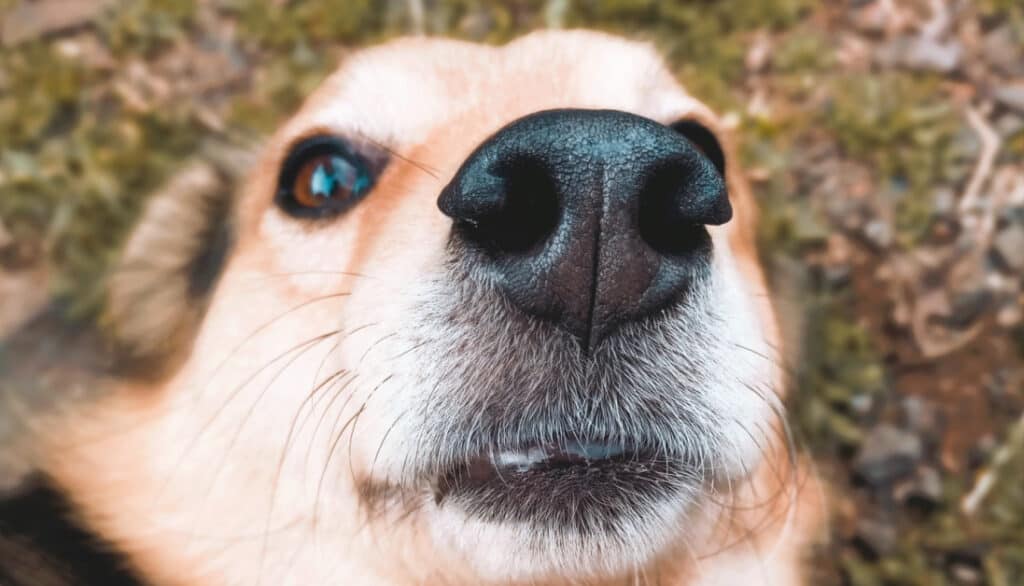
Commercial Products for Dry Nose in Dogs
To treat your dog’s dry nose with commercial products, you can rely on dog nose balms and nose oils as a solution. In this section on “Commercial Products for Dry Nose in Dogs,” focusing on the article “What Can I Put On My Dog’s Dry Nose? Find Out Here,” we will introduce two types of products – dog nose balms and dog nose oils – that can help moisturize and soothe your furry friend’s dry nose.
Dog Nose Balms
Canine nasal balm products are a popular remedy for dogs experiencing discomfort due to dry nose. These balms offer relief and protection to the sensitive skin on a dog’s nose, which can easily become chapped, cracked or irritated.
- Dog Nose Butter: A natural blend of moisturizing ingredients like shea butter, coconut oil and beeswax to soothe dry noses.
- Snout Soother: Contains essential vitamins that aid in restoring moisture and healing dryness that can cause flaky crusts.
- Natural Dog Company Snout Soother Balm: Rich in antioxidants with restorative powers that enhance speedy recovery from abrasions, cuts and cracks on a dog’s snout
- Simply Nourish Nose Balm: A healing blend of nutrients, including rosemary extract with antibacterial properties- repairs growing tissue and provides daily maintenance care for canine nasal health,
These balms also provide UV protection from harmful sun rays. While some products are silicone based, others are formulated using natural ingredients. With variations available in consistency and application preferences, dog nose balms cater to pet parents needs.

Dog Nose Oils
Using natural ingredients, oils made for dog noses are a great way to moisturize and soothe dryness on the surface and inside. They can protect from infection and inflammation in harsh environments. These products are also beneficial for dogs that use their nose frequently, like scent dogs or hunting breeds.
Some popular oils include coconut, olive, and sweet almond oil which provide nourishment while beeswax protects against environmental damage. Essential oils like lavender or eucalyptus can also be added for an extra calming effect.
It’s essential to note that not all essential oils are safe for dogs, so it’s best to do your research or ask a vet before using them. Furthermore, it’s recommended to check labels for any harmful chemicals and additives before applying.
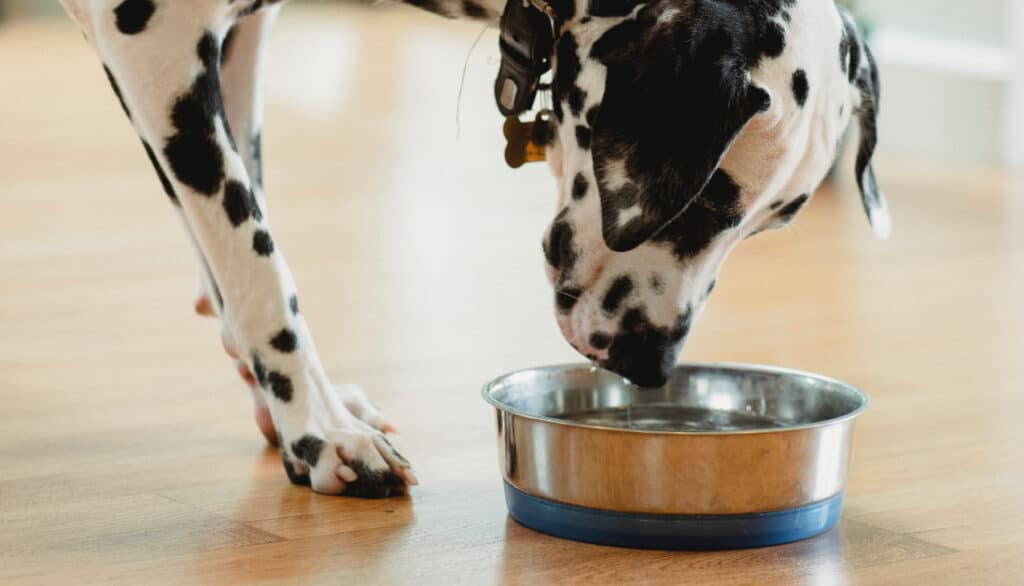
Prevention of Dry Nose in Dogs
To prevent your furry friend from having a dry nose, try these solutions in the ‘Prevention of Dry Nose in Dogs’ section with ‘Tips to Keep Your Dog’s Nose Hydrated’ and ‘Grooming Techniques.’ Both sub-sections offer valuable insight into maintaining a healthy moisture level in your dog’s nose and preventing dryness from occurring.
Tips to Keep Your Dog’s Nose Hydrated
To keep your furry friend’s nose well-hydrated and glowing, here are some tips to follow:
- Ensure that your dog drinks enough water daily.
- Avoid leaving your dog exposed to arid environments for extended periods of time.
- Incorporate moist foods in your dog’s meals.
- Consider using a humidifier, especially in dry seasons.
- Gently clean your dog’s nose regularly with a damp towel or sponge.
- Use petroleum jelly to moisturize the dry parts of the snout area.
Maintaining a hydrated and healthy snout not only ensures a balanced life for your furry baby but also prevents dehydration-related syndromes, such as painful cracks and nosebleeds. Remember, taking good care of their snout is just as important as their overall health status.
Grooming Techniques
Maintaining Canine Hygiene
Implementing adequate grooming practices can do wonders for preventing dry nose in dogs. Here’s a 5-step guide to effective canine hygiene:
- Brush your pet’s coat regularly with a soft-bristled brush
- Bathe your dog with pH-balanced and mild shampoos
- Keep paws clean and nails clipped
- Clean your dog’s ears gently with a cotton ball or cloth moistened with mineral oil
- Ensure that the teeth and gums are cleaned regularly to avoid tartar formation
It is recommended to seek advice from a qualified vet before initiating any grooming regimen for your furry friend.

When to See a Veterinarian
To ensure the proper health of your furry friend, being aware of the symptoms that require a visit to the veterinarian is crucial. In this segment titled “When to See a Veterinarian” with the sub-section “Symptoms that Indicate the Need to Visit a Vet,” we’ll cover the red flags that signify a need for professional attention.
Symptoms that Indicate the Need to Visit a Vet
Some Signs Your Pet May Need Veterinary Care
If your pet is exhibiting unusual behavior, looks or feels different than normal, or has symptoms that seem out of the ordinary, it may be time to take them to see a veterinarian. Here are some signs that your pet may need medical attention:
- Changes in appetite or thirst
- Problems with urination or defecation
- Persistent coughing, sneezing, or unexplained bleeding
It’s important to remember that every pet is unique and may show different symptoms based on their individual health needs. If you notice any changes in your pet’s behavior or appearance, it’s always best to err on the side of caution and consult with a qualified veterinarian.
Seeking veterinary care can prevent minor issues from becoming more serious and ensure the overall health and well-being of your beloved pet. If you’re unsure whether your pet needs medical attention, don’t hesitate to reach out to a trusted veterinary professional for guidance.
Remember – by keeping an eye out for any sudden changes in your furry friend’s behavior and acting quickly when necessary, you can help ensure they stay happy and healthy for many years to come!
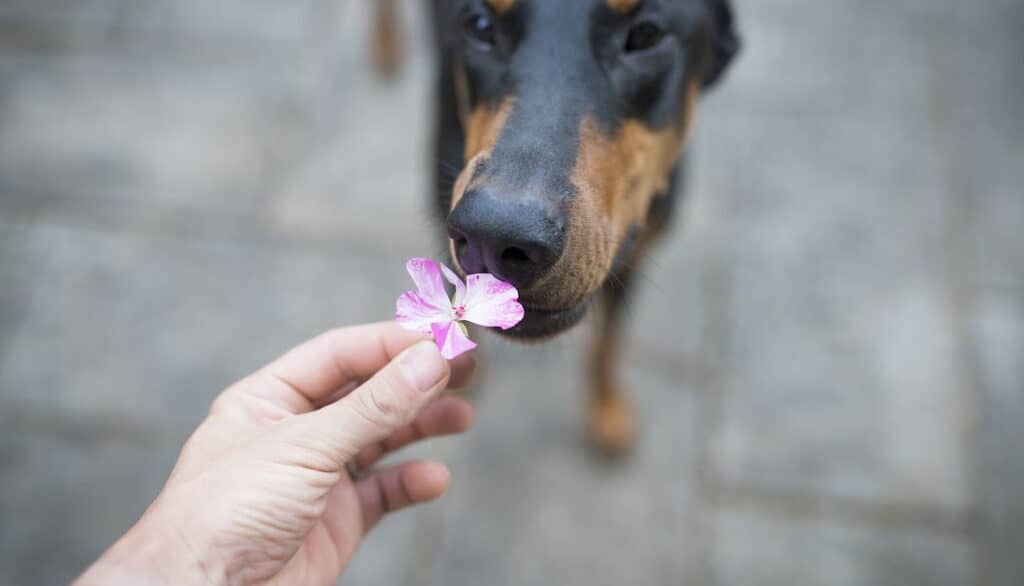
Conclusion
Treating your dog’s dry nose is essential for their overall health. There are several options available to pet owners, but the best solution depends on the cause of their dry nose. Popular remedies include applying coconut oil, petroleum jelly, or aloe vera gel to moisturize the area. However, if the nose is excessively dry or cracked, medical attention is required. It’s important to consult with a veterinarian to determine the root cause of your pet’s dry nose and discuss any concerns you may have regarding their treatment plan.
Frequently Asked Questions
A: A dog’s nose may dry out due to several reasons including dry weather, dehydration, aging, or an underlying medical issue.
A: Yes, you can apply a small amount of petroleum jelly to your dog’s dry nose to help moisturize it. However, make sure your dog doesn’t lick it off.
A: Yes, you can apply coconut oil, shea butter or vitamin E oil to your dog’s dry nose. These natural remedies are safe and effective in moisturizing and healing your dog’s nose.
A: Yes, frequent use of tissues or wipes may strip the natural oils from your dog’s nose, causing it to dry out. Instead, use a damp cloth to gently clean your dog’s nose.
A: No, it’s not recommended to use human products on your dog’s dry nose as they may contain ingredients that can be harmful to dogs. Always use products specifically made for dogs.
A: If your dog’s dry nose is accompanied by other symptoms such as lethargy, loss of appetite, or discharge from the nose, it’s best to take your dog to the vet for a check-up.
